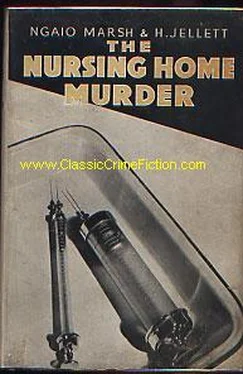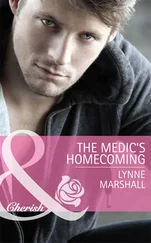Ngaio Marsh - The Nursing Home Murder
Здесь есть возможность читать онлайн «Ngaio Marsh - The Nursing Home Murder» — ознакомительный отрывок электронной книги совершенно бесплатно, а после прочтения отрывка купить полную версию. В некоторых случаях можно слушать аудио, скачать через торрент в формате fb2 и присутствует краткое содержание. Жанр: Классический детектив, на английском языке. Описание произведения, (предисловие) а так же отзывы посетителей доступны на портале библиотеки ЛибКат.
- Название:The Nursing Home Murder
- Автор:
- Жанр:
- Год:неизвестен
- ISBN:нет данных
- Рейтинг книги:5 / 5. Голосов: 1
-
Избранное:Добавить в избранное
- Отзывы:
-
Ваша оценка:
- 100
- 1
- 2
- 3
- 4
- 5
The Nursing Home Murder: краткое содержание, описание и аннотация
Предлагаем к чтению аннотацию, описание, краткое содержание или предисловие (зависит от того, что написал сам автор книги «The Nursing Home Murder»). Если вы не нашли необходимую информацию о книге — напишите в комментариях, мы постараемся отыскать её.
The Nursing Home Murder — читать онлайн ознакомительный отрывок
Ниже представлен текст книги, разбитый по страницам. Система сохранения места последней прочитанной страницы, позволяет с удобством читать онлайн бесплатно книгу «The Nursing Home Murder», без необходимости каждый раз заново искать на чём Вы остановились. Поставьте закладку, и сможете в любой момент перейти на страницу, на которой закончили чтение.
Интервал:
Закладка:
“Yes. I see. I will tell you. Many years ago I gave an overdose of morphia and the patient died as the result of my carelessness. I–I have never been able to bring myself to give an injection since. Psychologically my behaviour has been weak and unsound. I should have overcome this repulsion, but I have been unable to do so. For some time I even lost my nerve as an anæsthetist. Then I was called in for an urgent case with heart disease and the operation was successful.” He showed Alleyn his stethoscope and told him its history. “This instrument represents an interesting experiment in psychology. I began to mark on it all my successful cases of heart disease. It helped enormously, but I have never been able to face an injection. Perhaps some day I may. Sir John is aware of this — peculiarity. I told him of it the first time I gave an anæsthetic for him. It was some time ago in a private house. He very thoughtfully remembered. I believe that in any case he prefers to give the hyoscine injection himself.”
He turned very white as he made this unhappy confession, and it was curious to see how, in spite of his obvious distress, he did not lose his trick of formal phraseology.
“Thank you so much, Dr. Roberts,” said Alleyn gently. “We need not trouble any more about that. Now, you say you were worried almost from the start about Sir Derek’s condition. Would you describe this condition as consistent with hyoscine poisoning?”
“Ever since Thoms rang up I have been considering that point. Yes, I think I should. In the light of the autopsy, of course, one is tempted to correlate the two without further consideration.”
“Did you notice any definite change in the patient’s condition, or did the same symptoms simply get more and more acute, if that’s the right way of putting it?”
“The pulse was remarkably slow when I first examined him in the anæsthetising-room. The condition grew steadily more disquieting throughout the operation.”
“But, to stress my point, there was no decided change at any time, only a more or less gradual progression.”
“Yes. There was perhaps a rather marked increase in the symptoms after Sir John made the first incision.”
“That would be after he had given the hyoscine injection, wouldn’t it?”
Roberts glanced at him sharply.
“Yes, that is true,” he said quickly, “but do you not see, the small amount Sir John injected — a hundredth of a grain, I think it was — would naturally aggravate the condition if hyoscine had already been given?”
“That’s perfectly true,” agreed Alleyn. “It’s an important point, too. Look here, Dr. Roberts, may I take it that it’s your opinion that hyoscine — a fatal amount — was somehow or other got into the man before the operation?”
“I think so,” Roberts blinked nervously. He had that trick of blinking hard, twice — it reminded Alleyn of a highly strung boy. “Of course,” he added uneasily, “I realise, inspector, that it would probably be to my advantage if I said that I thought the lethal dose was given when the patient was on the table. That, however, is, in my opinion, most improbable.”
“I must here trot out my customary cliché that it is always to an innocent person’s advantage to tell the truth,” Alleyn assured him. “Do you know, it’s my opinion that at least two-thirds of the difficulties in homicidal cases are caused by innocent asses lying for all they’re worth.”
“Indeed? I suppose there is no possibility of suicide in this instance?”
“It seems very unlikely so far. Why? How? Where’s the motive?”
“There need not necessarily be any usual motive.” Roberts hesitated and then spoke with more assurance than he had shown so far. “In suggesting this,” he said, “I may be accused of mounting my special hobbyhorse. As you have seen, I am greatly interested in hereditary taints. In Sir Derek O’Callaghan’s family there is such a taint. In his father, Sir Blake O’Callaghan, it appeared. I believe he suffered at times from suicidal mania. There has been a great deal of injudicious inbreeding. Mark you, I am perfectly well aware that the usual whole-hearted condemnation of inbreeding is to be revised in the light— ”
He had lost all his nervousness. He lectured Alleyn roundly for ten minutes, getting highly excited. He quoted his own works and other authorities. He scolded the British public, in the person of one of their most distinguished policemen, for their criminal neglect of racial problems. Alleyn listened, meek and greatly interested. He asked questions. Roberts got books from his shelves, read long passages in a high-pitched voice, and left the volumes on the hearthrug. He told Alleyn he should pay more attention to such things, and finally, to the inspector’s secret amusement, asked him flatly if he knew, if he had taken the trouble to find out, whether he himself was free from all traces of hereditary insanity.
“I had a great-aunt who left all her money to a muffin-man with coloured blood,” said Alleyn. “She was undoubtedly bats. Otherwise I have nothing to tell you, Dr. Roberts.”
Roberts listened to this gravely and continued his harangue. By the time it was over Alleyn felt that he had heard most of the theories propounded at the International Congress on Sex Reform and then some more. They were interrupted by the man-servant, who came in to announce dinner.
“Inspector Alleyn will dine,” said Roberts impatiently.
“No — really,” said Alleyn. “Thank you so much, but I must go. I’d love to, but I can’t.” The man went out.
“Why not?” asked Roberts rather huffily.
“Because I’ve got a murder to solve.”
“Oh,” he said, rather nonplussed and vexed. Then as this remark sank in, his former manner returned to him. He eyed Alleyn nervously, blinked, and got to his feet.
“I am sorry. I become somewhat absorbed when my pet subject is under discussion.”
“I too have been absorbed,” Alleyn told him. “You must forgive me for staying so long. I may have to reconstruct the operation — perhaps if I do you will be very kind and help me by coming along?”
“I — yes, if it is necessary. It will be very distasteful.”
“I know. It may not be necessary, but if it is— ”
“I shall do my part, certainly.”
“Right. I must bolt. This has been an unpropitious sort of introduction, Dr. Roberts, but I hope I may be allowed to renew our talk without prejudice some time. The average bloke’s ignorance of racial problems is deplorable.”
“It’s worse than that,” said Roberts crisply. “It’s lamentable — criminal. I should have thought in your profession it was essential to understand at least the rudiments of the hereditary problem. How can you expect— ” He scolded on for some time. The servant looked in, cast up his eyes in pious resignation and waited. Roberts gave Alleyn his book. “It’s the soundest popular work on the subject, though I do not pretend to cover a fraction of the ground. You’d better come back here when you’ve read it.”
“I will. Thank you a thousand times,” murmured the inspector and made for the door. He waited until the servant had gone into the hall and then turned back.
“Look here,” he said quietly. “Can I take it you think the man committed, suicide?”
Again Roberts turned into a rather frightened little man.
“I can’t say — I–I sincerely hope so. In view of his history, I think it’s quite possible — but, of course, the drug — hyoscine — it’s very unusual.” He stopped and seemed to think deeply for a moment, Then he gave Alleyn a very earnest and somehow pathetic look. “I hope very much indeed that it may be found to be suicide,” he said quietly. “The alternative is quite unthinkable. It would cast the most terrible slur conceivable upon a profession of which I am an insignificant unit, but which I deeply revere. I would hold myself in part responsible. Self-interest is at the bottom of most motives, they say, but something more than self-interest, I think, prompts me to beg most earnestly that you explore the possibility of suicide to its utmost limit. I have kept you too long. Good night, Inspector Alleyn.”
Читать дальшеИнтервал:
Закладка:
Похожие книги на «The Nursing Home Murder»
Представляем Вашему вниманию похожие книги на «The Nursing Home Murder» списком для выбора. Мы отобрали схожую по названию и смыслу литературу в надежде предоставить читателям больше вариантов отыскать новые, интересные, ещё непрочитанные произведения.
Обсуждение, отзывы о книге «The Nursing Home Murder» и просто собственные мнения читателей. Оставьте ваши комментарии, напишите, что Вы думаете о произведении, его смысле или главных героях. Укажите что конкретно понравилось, а что нет, и почему Вы так считаете.











